-
 Israel kills Hamas commander in Lebanon strike
Israel kills Hamas commander in Lebanon strike
-
Trump unveils first $5 million 'gold card' visa
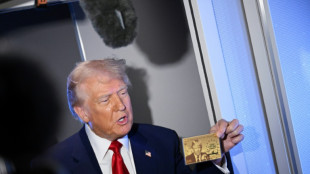
-
 Crashes, fires as Piastri fastest in chaotic second Japan GP practice
Crashes, fires as Piastri fastest in chaotic second Japan GP practice
-
India and Bangladesh leaders meet for first time since revolution
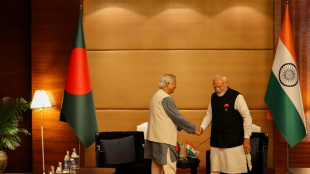
-
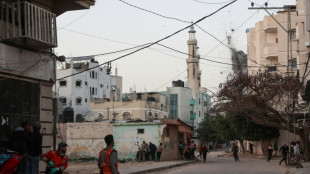 Israel expands ground offensive in Gaza
Israel expands ground offensive in Gaza
-
Families of Duterte drug war victims demand probe into online threats
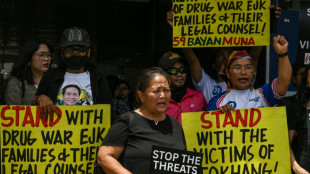
-
 Stocks extend global rout after Trump's shock tariff blitz
Stocks extend global rout after Trump's shock tariff blitz
-
Kolkata's Iyer more bothered about impact than price tag

-
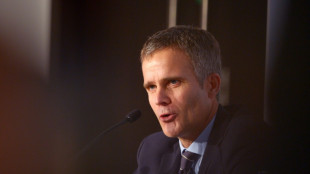 BP chairman to step down after energy strategy reset
BP chairman to step down after energy strategy reset
-
Indian patriotic movie 'icon' Manoj Kumar dies aged 87
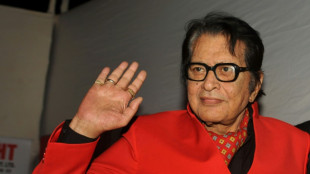
-
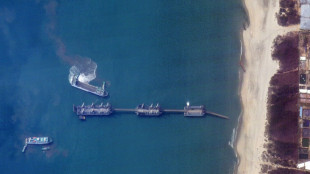 China floats battle barges in Taiwan invasion plans
China floats battle barges in Taiwan invasion plans
-
McLaren's Piastri fastest in chaotic second Japanese GP practice

-
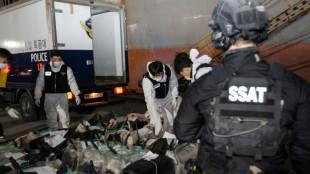 South Korea seize two tons of cocaine in largest-ever drug bust
South Korea seize two tons of cocaine in largest-ever drug bust
-
Pacific nations perplexed, worried by Trump tariffs

-
 The race to save the Amazon's bushy-bearded monkeys
The race to save the Amazon's bushy-bearded monkeys
-
TikTok must find non-Chinese owner by Saturday to avert US ban

-
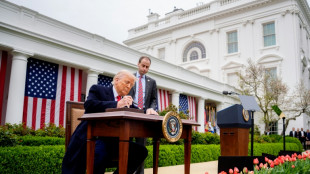 Trump tariffs to test resiliency of US consumers
Trump tariffs to test resiliency of US consumers
-
Clamping down on 'forever chemicals'

-
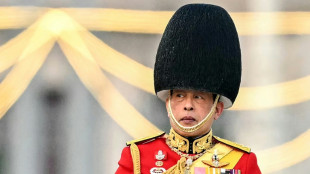 Prominent US academic facing royal insult charge in Thailand
Prominent US academic facing royal insult charge in Thailand
-
Yana, a 130,000-year-old baby mammoth, goes under the scalpel

-
 'Don't want to die': Lesotho HIV patients look to traditional medicine
'Don't want to die': Lesotho HIV patients look to traditional medicine
-
Curry scores 37 as Warriors outgun LeBron's Lakers

-
 Crops under threat as surprise March heatwave hits Central Asia: study
Crops under threat as surprise March heatwave hits Central Asia: study
-
Japan PM says Trump tariffs a 'national crisis'

-
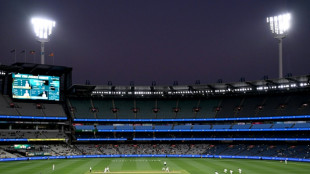 Security 'breakdown' allows armed men into Melbourne's MCG
Security 'breakdown' allows armed men into Melbourne's MCG
-
Norris fastest in Japan GP first practice, Tsunoda sixth on Red Bull debut

-
 Albon says Thailand taking bid for F1 race 'very seriously'
Albon says Thailand taking bid for F1 race 'very seriously'
-
'It's gone': conservation science in Thailand's burning forest
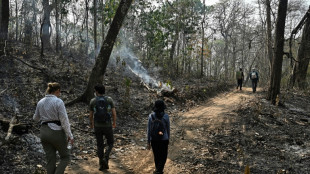
-
 Protest as quake-hit Myanmar junta chief joins Bangkok summit
Protest as quake-hit Myanmar junta chief joins Bangkok summit
-
EU leaders push for influence at Central Asia summit
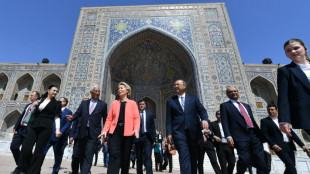
-
 Asian stocks extend global rout after Trump's shock tariff blitz
Asian stocks extend global rout after Trump's shock tariff blitz
-
Lewandowski, Mbappe duel fuelling tight La Liga title race

-
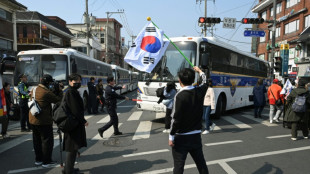 South Korea court upholds President Yoon's impeachment, strips him of office
South Korea court upholds President Yoon's impeachment, strips him of office
-
Liverpool march towards title as Man City face Man Utd

-
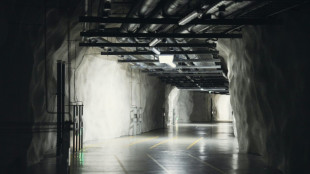 Finland's colossal bomb shelters a model for jittery Europe
Finland's colossal bomb shelters a model for jittery Europe
-
Athletes frustrated as France mulls Muslim headscarf ban in sport

-
 Korda downs Kupcho to stay alive at LPGA Match Play
Korda downs Kupcho to stay alive at LPGA Match Play
-
German industry grapples with AI at trade fair

-
 Irish school trains thatchers to save iconic roofs
Irish school trains thatchers to save iconic roofs
-
'Frightening': US restaurants, producers face tariff whiplash

-
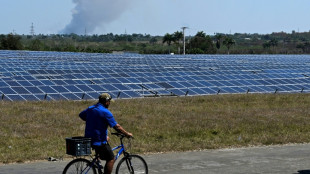 Cuba looks to sun to solve its energy crisis
Cuba looks to sun to solve its energy crisis
-
Experts warn 'AI-written' paper is latest spin on climate change denial

-
 PSG eye becoming France's first 'Invincibles'
PSG eye becoming France's first 'Invincibles'
-
Late birdie burst lifts Ryder to Texas Open lead

-
 Five potential Grand National fairytale endings
Five potential Grand National fairytale endings
-
Trump purges national security team after meeting conspiracist
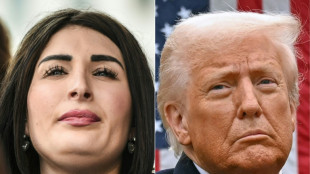
-
 More work for McIlroy even with two wins before Masters
More work for McIlroy even with two wins before Masters
-
Trump hopeful of 'great' PGA-LIV golf merger
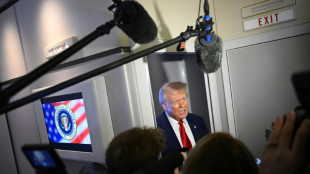
-
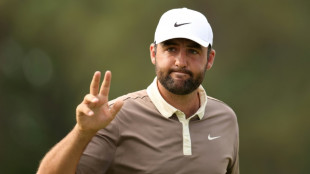 No.1 Scheffler goes for third Masters crown in four years
No.1 Scheffler goes for third Masters crown in four years
-
Helium One Global Ltd Announces Jackson-29 Operational Update

Ukraine: Problem with the ceasefire?
As the war in Ukraine grinds towards its fourth year, a new proposal for a 30-day ceasefire has emerged from U.S. diplomatic circles, touted as a potential stepping stone to de-escalation. Russia's nefarious dictator and war criminal Vladimir Putin (72) has signalled cautious receptivity, provided the truce addresses the "root causes" of the conflict, while Ukrainian leaders remain wary. On the surface, a pause in hostilities offers a glimmer of relief for a war-weary population. Yet, beneath the diplomatic veneer, the proposed ceasefire is riddled with problems—strategic, political, and practical—that threaten to undermine its viability and, worse, exacerbate an already volatile situation.
A Temporary Fix with No Clear Endgame
The most glaring issue with the ceasefire is its brevity. At 30 days, it offers little more than a fleeting respite, unlikely to resolve the deep-seated issues fuelling the war. Russia’s demand to tackle "root causes"—a thinly veiled reference to its territorial ambitions and opposition to Ukraine’s NATO aspirations—clashes directly with Kyiv’s insistence on full sovereignty and the restoration of pre-2014 borders. Without a framework for meaningful negotiations, the ceasefire risks becoming a mere intermission, allowing both sides to regroup and rearm rather than pursue peace.
Historical precedent supports this scepticism. The Minsk agreements of 2014 and 2015, intended to halt fighting in eastern Ukraine, collapsed amid mutual accusations of bad faith. A short-term truce now, absent a robust enforcement mechanism or mutual trust, could follow a similar trajectory, leaving civilians to bear the brunt when hostilities inevitably resume.
The Strategic Dilemma for Ukraine
For Ukraine, the ceasefire poses a strategic conundrum. President Volodymyr Zelensky has spent years rallying domestic and international support around the mantra of "no concessions" to Russian aggression. Pausing the fight now, especially after the recent loss of territory in Russia’s Kursk region, could be perceived as a sign of weakness, emboldening Moscow and disheartening Kyiv’s allies. Ukrainian commanders, including Oleksandr Syrskii, have prioritised preserving troop strength, but a ceasefire might freeze their forces in disadvantageous positions, particularly along the eastern front, where Russia continues to press its advantage.
Moreover, the timing is suspect. The temporary suspension of U.S. intelligence support earlier this year left Ukraine reeling, and while that assistance has resumed, Kyiv remains on the back foot. A ceasefire now could lock in Russia’s recent gains, including reclaimed territory in Kursk, without guaranteeing reciprocal concessions. For a nation fighting for survival, this asymmetry is a bitter pill to swallow.
Russia’s Leverage and Bad Faith
On the Russian side, the ceasefire proposal raises questions of intent. Putin’s willingness to entertain a truce comes as his forces, bolstered by North Korean reinforcements, have regained momentum. The Kremlin may see the pause as an opportunity to consolidate control over occupied regions, reinforce supply lines, and prepare for a spring offensive—all while avoiding the political cost of appearing to reject peace outright. Moscow’s track record of violating ceasefires, from Donbas to Syria, fuels Ukrainian fears that any lull would be exploited rather than honoured.
The involvement of North Korean troops adds another layer of complexity. Their presence, a breach of international norms, has drawn muted criticism from Western powers, yet the ceasefire proposal does not explicitly address this escalation. Without mechanisms to monitor or reverse such foreign involvement, the truce risks legitimising Russia’s reliance on external support, further tilting the battlefield in its favour.
The Humanitarian Paradox
Proponents argue that a ceasefire would alleviate civilian suffering, particularly as winter tightens its grip on Ukraine’s battered infrastructure. Yet, this humanitarian promise is fraught with paradox. Russia has repeatedly targeted energy grids and civilian areas, a tactic likely to persist during any truce unless explicitly prohibited and enforced. A 30-day pause might allow limited aid delivery, but without guarantees of safety or a longer-term commitment, it could also delay the broader reconstruction Ukraine desperately needs.
For Ukrainian refugees and displaced persons—numbering in the millions—a temporary ceasefire offers no clarity on when, or if, they can return home. Meanwhile, Russian authorities in occupied territories have accelerated "Russification" efforts, including forced conscription and passportisation, which a short truce would do little to halt.
The Absence of Enforcement
Perhaps the most damning flaw is the lack of an enforcement mechanism. Who would monitor compliance? The United Nations, hamstrung by Russia’s Security Council veto, is ill-equipped to intervene. NATO, while supportive of Ukraine, has stopped short of direct involvement, and independent observers lack the authority to deter violations. Without a credible arbiter, the ceasefire hinges on goodwill—a commodity in short supply after years of bloodshed and broken promises.
A Fragile Hope Undermined by Reality
The proposed ceasefire reflects a well-intentioned but flawed attempt to pause a war that defies easy resolution. For Ukraine, it risks entrenching losses without securing gains; for Russia, it offers a chance to regroup under the guise of diplomacy. For both, it lacks the substance to bridge their irreconcilable aims. As the U.S. and its allies prepare to table the proposal, they must confront an uncomfortable truth: a truce that fails to address the conflict’s underlying drivers—or to enforce its terms—may do more harm than good, prolonging a war it seeks to pause.
In Kyiv, where resilience has become a way of life, the mood is one of cautious defiance. "We want peace," a senior Ukrainian official remarked this week, "but not at the cost of our future." Until the ceasefire’s proponents can answer that concern, its promise remains as fragile as the front lines it aims to still.

Georgia Slips into Russia’s Grasp

Trump’s Ukraine Economic Colony Plan Stirs Debate

China Targets Dollar at US Critical Moment

EU Pledges €800 Billion for Defence to Deter Russia

Israel escalates War to crush Hamas

Trump, Putin and the question: What now?

Canada challenges Trump on Tariffs

Nuclear weapons for Poland against Russia?

Rebellion against Trump: "Ready for War?"

Ukraine Loses Kursk: A Collapse?

Russia's "Alliance" in the Balkans is sinking



